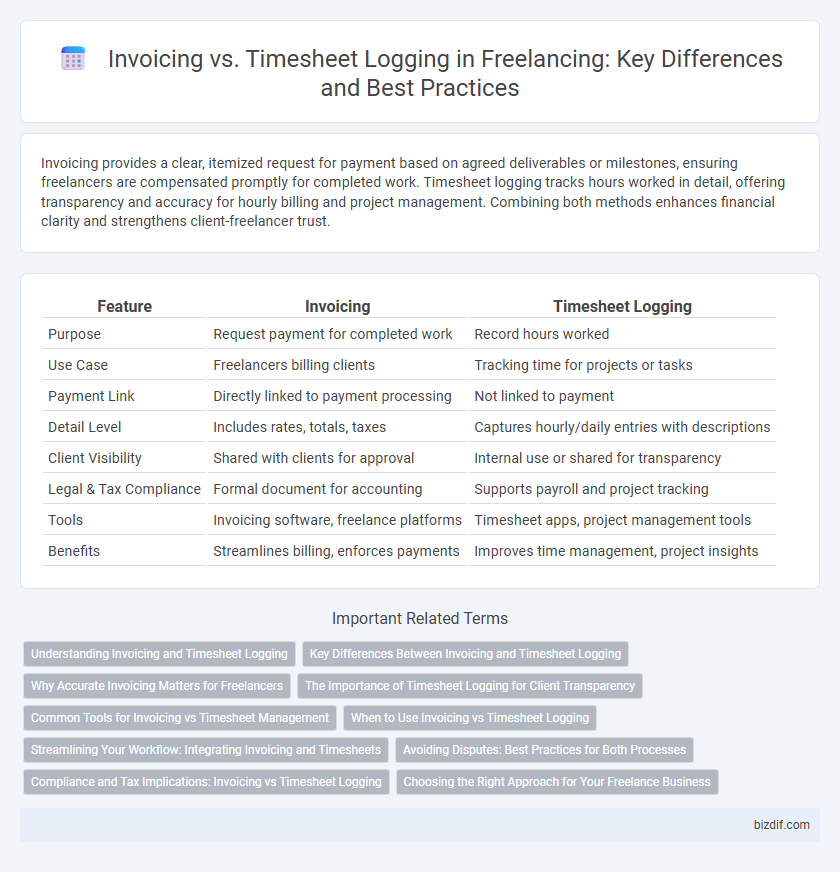Invoicing provides a clear, itemized request for payment based on agreed deliverables or milestones, ensuring freelancers are compensated promptly for completed work. Timesheet logging tracks hours worked in detail, offering transparency and accuracy for hourly billing and project management. Combining both methods enhances financial clarity and strengthens client-freelancer trust.
Table of Comparison
| Feature | Invoicing | Timesheet Logging |
|---|---|---|
| Purpose | Request payment for completed work | Record hours worked |
| Use Case | Freelancers billing clients | Tracking time for projects or tasks |
| Payment Link | Directly linked to payment processing | Not linked to payment |
| Detail Level | Includes rates, totals, taxes | Captures hourly/daily entries with descriptions |
| Client Visibility | Shared with clients for approval | Internal use or shared for transparency |
| Legal & Tax Compliance | Formal document for accounting | Supports payroll and project tracking |
| Tools | Invoicing software, freelance platforms | Timesheet apps, project management tools |
| Benefits | Streamlines billing, enforces payments | Improves time management, project insights |
Understanding Invoicing and Timesheet Logging
Invoicing involves billing clients for completed work, detailing services rendered, payment terms, and amounts due to ensure clear financial transactions. Timesheet logging tracks hours worked on specific tasks or projects, providing accurate records for hourly billing and project management. Understanding both helps freelancers maintain transparent communication, accurate payment tracking, and efficient workflow management.
Key Differences Between Invoicing and Timesheet Logging
Invoicing and timesheet logging are essential tools for freelancers to track work and ensure proper payment. Invoicing is a formal request for payment that summarizes completed tasks, hours worked, and agreed-upon rates, while timesheet logging records detailed daily work hours and activities for internal tracking or client transparency. Key differences include invoicing being a bill for payment issued periodically, whereas timesheets serve as detailed time management and accountability documents.
Why Accurate Invoicing Matters for Freelancers
Accurate invoicing is crucial for freelancers to ensure timely payments and maintain cash flow stability. Proper invoicing reflects the precise hours worked and services rendered, reducing disputes and fostering client trust. This financial transparency supports professional credibility and facilitates efficient tax reporting and business management.
The Importance of Timesheet Logging for Client Transparency
Timesheet logging ensures precise tracking of hours worked, fostering transparency that builds client trust and reduces billing disputes. Detailed timesheets provide clients with real-time insights into project progress and resource allocation, enhancing accountability. Accurate time records support clearer communication and help freelancers justify their invoices with verifiable data.
Common Tools for Invoicing vs Timesheet Management
Common tools for invoicing include platforms like FreshBooks, QuickBooks, and Wave, designed to streamline billing, generate professional invoices, and track payments efficiently. For timesheet management, popular tools such as Toggl Track, Harvest, and Clockify offer precise time tracking, project time allocation, and productivity analysis features. Integrating these tools with accounting or project management software enhances workflow automation and ensures accurate financial records in freelancing projects.
When to Use Invoicing vs Timesheet Logging
Invoicing is ideal for projects with fixed rates or predefined milestones, ensuring clear payment terms and client expectations. Timesheet logging suits hourly-based work, allowing detailed tracking of hours spent and accurate billing. Choosing between invoicing and timesheet logging depends on project scope, billing structure, and client preferences to maximize transparency and payment efficiency.
Streamlining Your Workflow: Integrating Invoicing and Timesheets
Streamlining your freelancing workflow involves integrating invoicing and timesheet logging to enhance efficiency and accuracy. Automated tools that sync time-tracking data with invoice generation reduce errors and save administrative time. This integration ensures transparent billing, improves client trust, and accelerates payment cycles.
Avoiding Disputes: Best Practices for Both Processes
Clear and detailed invoicing alongside accurate timesheet logging significantly reduces disputes in freelancing projects by establishing transparent records of work performed and payment owed. Utilizing consistent, standardized templates for invoices and timesheets helps ensure all parties agree on deliverables, hours worked, and rates before project completion. Regular communication with clients to review and approve logged hours and invoice details further strengthens trust and minimizes misunderstandings.
Compliance and Tax Implications: Invoicing vs Timesheet Logging
Invoicing provides a clear, itemized record of services rendered, essential for tax reporting and compliance with local regulations, as it demonstrates revenue received and facilitates VAT or sales tax calculations. Timesheet logging supports compliance by accurately tracking billable hours, ensuring transparent labor reporting for contracts and audits, and substantiating income claims during tax assessments. Freelancers must balance detailed invoicing with precise timesheet records to meet tax authority requirements and avoid penalties related to underreporting or inconsistent documentation.
Choosing the Right Approach for Your Freelance Business
Selecting between invoicing and timesheet logging hinges on your freelance business model and client preferences. Invoicing suits fixed-price projects by clearly outlining payment terms, while timesheet logging excels for hourly contracts, ensuring accurate billing through detailed work tracking. Utilizing tools like FreshBooks or Toggl enhances accuracy and professionalism in both invoicing and timesheet management.
Invoicing vs Timesheet logging Infographic

 bizdif.com
bizdif.com